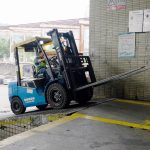With the growing number of electric vehicles on the streets and increased electrification in many industries, the demand for batteries is expanding significantly. According to the European Automobile Manufacturers’ Association (ACEA) the number of new electric vehicle (EV) registrations rose by 63% in 2021 as compared to the previous year.
Consequently, experts predict battery production capacities in Europe to multiply by a factor of 20 by 2030. The rapid growth of battery production is reshaping automotive supply chains as we know them.
“Lithium-ion batteries are classified as Dangerous Goods. Thus, they are subject to strict safety regulations during transportation and storage,” says Christian Hemming, Technical Director EMEA at ORBIS Europe. “Transporting the large number of batteries in a safe and sustainable way can be a challenge.”
How E-Mobility Affects Supply Chains
Packaging for battery transport must meet high government standards and conform with customer needs at the same time. Battery manufacturers and OEMs are in need of UN-certified, automation-friendly and customised packaging solutions. During transportation, the batteries need to be protected from external influences, such as shocks.
Hemming explains: “It is the packaging industry’s job to protect the product from the environment and the environment from the product.”
UN-Certified Reusable Plastic Packaging Ensures Safety With a robust design and customised dunnage, plastic transport packaging fulfils all these requirements. ORBIS has designed the IonPak as a reusable plastic container for safe transportation of Lithium-Ion Batteries. Transporting other solid dangerous goods such as airbags and belt tensioners is also possible. The foldable large container is UN-approved to transport solid dangerous goods (Packing Group II) and certified in accordance with RID / ADR (UN4H2/UN50H).
The customised packaging consists of a robust foldable large container with European standard footprints (1200 x 800 / 1200 x 1000 / 1600 x 1200 mm) and an inner packaging solution optimised to protect dangerous goods.
Reusable Instead of One-Way
“Still today, single-use packaging is the norm for transporting batteries and other solid dangerous goods. These are produced and then disposed of after every single use. That has to change,” says Hemming. ORBIS‘ reusable packaging solutions are made primarily from recycled materials – with a recycling rate of 100 % at end-of-life. Already during production, that saves around 60kg of CO2 per load carrier.
While electric cars emit less carbon on the road than cars with combustion engines, almost 80% more CO2 is emitted during the manufacturing process. “That’s why it is even more important to make production and supply chains as sustainable as possible,” explains Hemming.
ORBIS’ whitepaper “How to Transport Dangerous Goods – Safe and Sustainable Battery Transportation with Reusable Packaging” offers additional information and is available for download HERE.
The post Safe and sustainable battery transportation appeared first on Logistics Business® Magazine.


